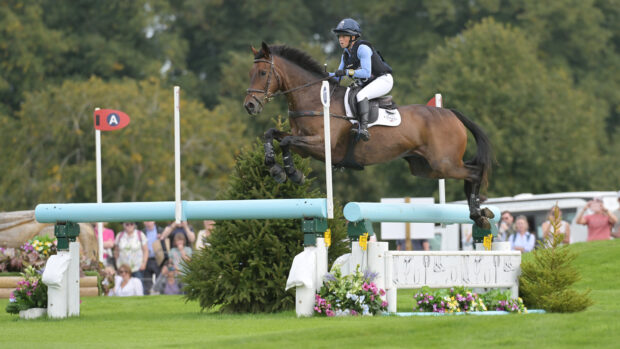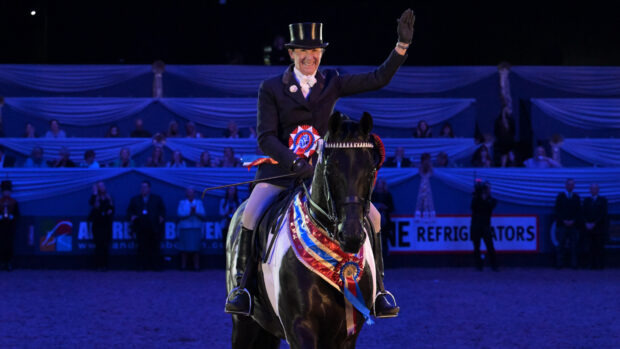THE equestrian community needs to see there are efforts being made to combat the equine obesity epidemic, it is believed, as a major initiative returns in extended form.
The “Weigh to Win”, a scheme in which awards for the healthiest body condition are given in showing classes, is back for 2022, at more shows than before, as well as a raft of new initiatives all aimed at helping improve owner understanding and equine welfare.
The awards, run by The Horse Trust and researcher Tamzin Furtado, were first given out in 2019, and will this year feature at more than 40 unaffiliated and affiliated shows.
This includes the Royal International Horse Show (RIHS), which has been involved since the start of the scheme.
RIHS director of showing David Ingle, formerly chairman of the Showing Council, told H&H more classes will be involved this year, for ponies and horses.
“In this ever-changing world, and with such big discussions on welfare and the weight debate, it’s really important this is visible and transparent,” he said.
“I was at the British Show Pony Society judges’ conference this year and people were saying nothing is being done about this. I was able to say something is being done, but it shows not enough people know about it. I saw what happened at Royal Windsor and thought that is exactly why we need to do more.”
Mr Ingle said when he first spoke of the awards scheme, “a lot of people said ‘You can’t do that’”.
“I struggle to understand why people would be cross about it,” he added. “A few people have been less than supportive but I hope that’s changing; a few societies have had Tamzin and Jan [Rogers, of The Horse Trust] talking to them, which is a really big step. We must open the door to the welfare side of things, and not be fearful of it.”
Mr Ingle would like an environment in which people are not afraid to ask for help on equine weight management; he said if people feel they are able to approach Dr Furtado for advice at a show, that would be “wonderful”. And he believes that, as excess weight is so serious an equine welfare issue, the education and advice provided through the scheme will “give horses better lives”.
“I don’t want anyone saying we’re not doing anything about this; we are and I’m proud of it,” he said. “It’s all about education and understanding – and we have absolutely no choice in this. We have responsibility for our equine partners’ welfare and that has to be our top priority, and it is at the RIHS. This issue is not going away, and neither should it.”
Dr Furtado told H&H the highlighting of some horses’ excess weight at Royal Windsor has “ramped up” some of the plans and ideas.
“One idea could be having a vet at every class to condition-score and eliminate the [obese horses],” she said. “That might not be possible but should there be more being done, and if so, what, and how can we make sure everyone is positive about it?”
Dr Furtado, whose PhD was on owner attitudes to equine obesity, said other options include having weighbridges and people to condition-score animals at shows with their owners, so the owners understand why a horse has been given a certain score. Another idea is for shows to be branded as healthy condition-aware, so competitors will know their horses must be in good condition, and judges will feel supported by organisers in telling an owner an animal is overweight, or marking it down.
“Then everyone’s on board and there isn’t the vicious circle of competitors thinking the judges want them fat, and the judges say they don’t, but people bring forward overweight horses, so what are they supposed to do,” she said.
Dr Furtado has always been in favour of rewarding good practice, advising and educating owners of horses who are overweight rather than criticising, and “working with the showing community in a positive way, so they feel supported in making changes”.
Lucy Grieve, immediate past President of the British Equine Veterinary Association (BEVA), and chair of BEVA’s ethics and welfare committee, told H&H: “BEVA is celebrating news that members of the UK showing world have chosen to embrace the healthiest body condition award scheme again this year and adopt it even more widely than before.
“The fact that people are recognising the importance of the subject and choosing to do something about it, is the breakthrough we have been hoping for. It is thanks to the hard work and determination of the Horse Trust and Tamzin Furtado that inroads have been made with this scheme, enabling all involved to understand not only the dangers and welfare implications of obesity in horses, but also to start changing people’s beliefs and perceptions that this habit, or fashion, has to persist in showing.
“If we all make the effort to learn what is a healthy weight and what is not, we can avoid putting horses at risk of life-threatening laminitis purely to comply with current shape trends. Seeing change move across the showing world is what vets have been hoping to see for years, and this scheme looks to be creating the very wave that was needed to make overweight horses in the show ring a thing of the past.”
You might also be interested in:

Major show gives signs of hope in battle against equine obesity

Vets’ extreme disappointment at overweight show horses at Royal Windsor

Subscribe to Horse & Hound magazine today – and enjoy unlimited website access all year round
Horse & Hound magazine, out every Thursday, is packed with all the latest news and reports, as well as interviews, specials, nostalgia, vet and training advice. Find how you can enjoy the magazine delivered to your door every week, plus options to upgrade your subscription to access our online service that brings you breaking news and reports as well as other benefits.




